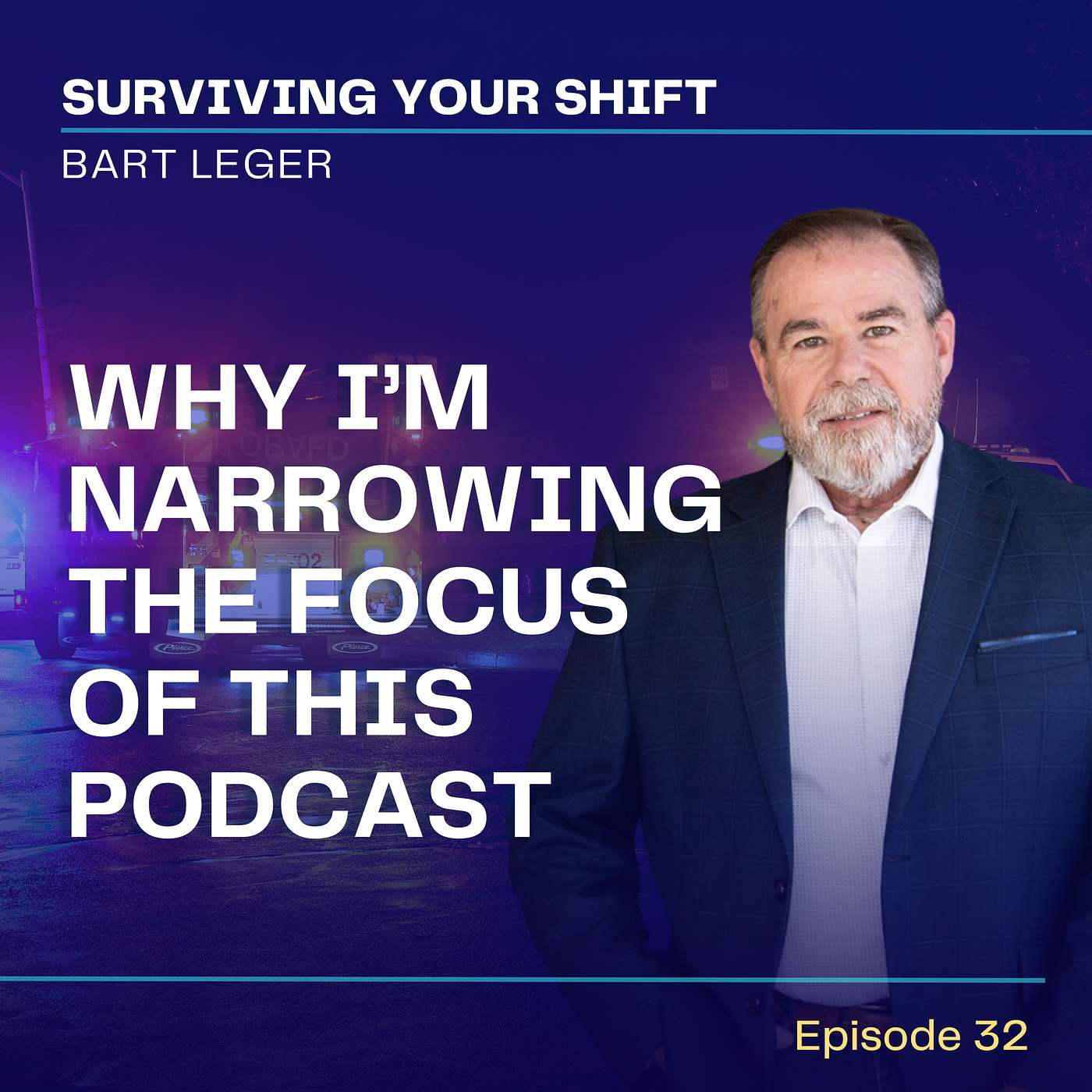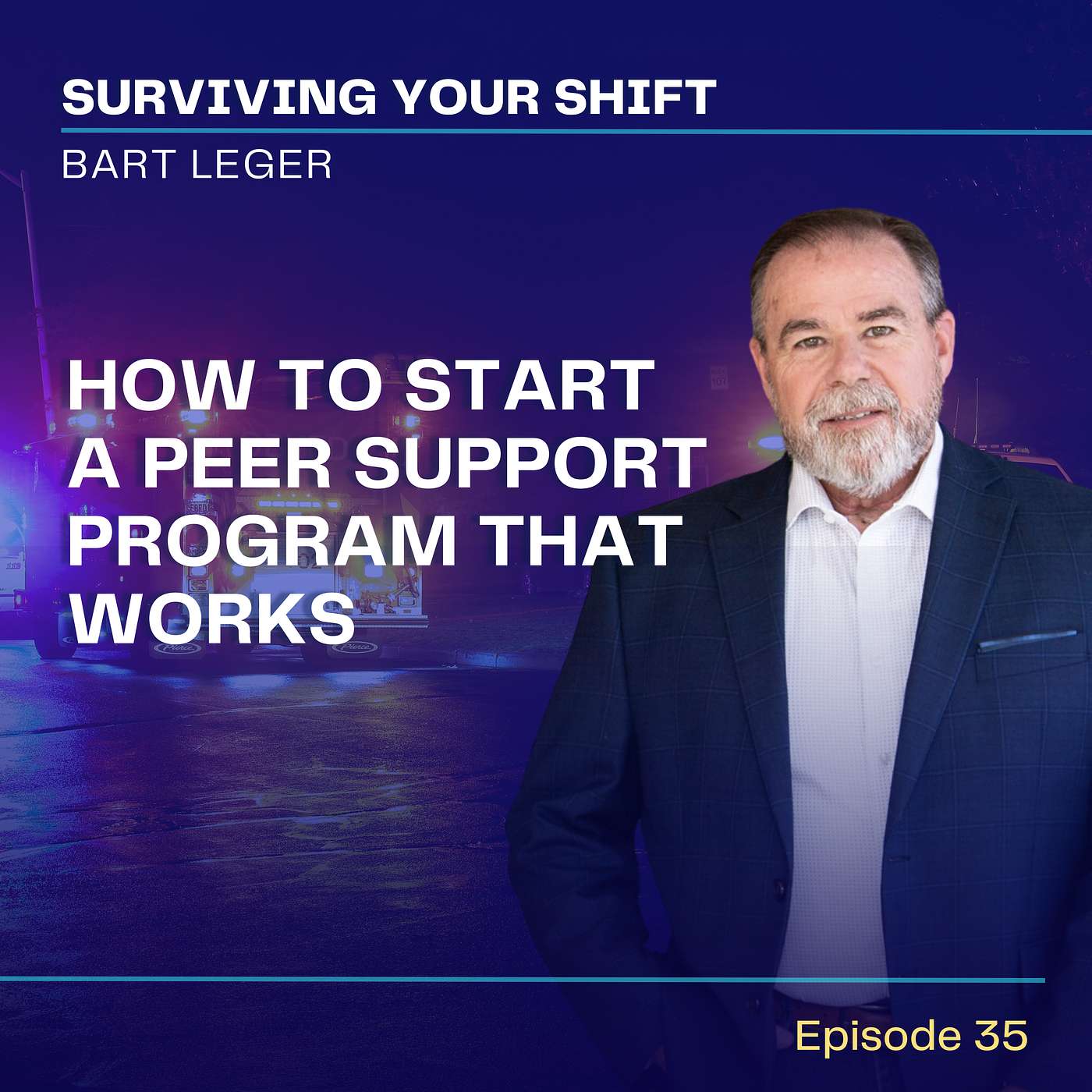Why I’m Narrowing the Focus of This Podcast

Peer support can save careers, and lives. This episode reveals why Surviving Your Shift is narrowing its focus and how it will equip you to build a strong peer support culture in your organization.
Peer support can save careers, and lives. This episode reveals why Surviving Your Shift is narrowing its focus and how it will equip you to build a strong peer support culture in your organization.
Are you tired of seeing your coworkers burn out, break down, or just barely get by, and wondering what you can do to help?
You’re not alone. Many first responders and frontline professionals feel called to support their peers, but don’t know where to start—or if they’re even qualified.
This episode marks a big shift in the podcast. We’re going all in on peer support—what it is, why it works, and how to do it well. Whether you’re part of a peer support team or thinking about starting one, this show is now your go-to resource.
BY THE TIME YOU FINISH LISTENING, YOU’LL FIND OUT:
- Why peer support isn’t just “nice to have”—it’s essential to saving lives, money, and morale
- What kind of stories, guests, and training you can expect in future episodes
- How you can share your own story to help shape a practical guide for building peer teams that actually work
We’re not just talking about culture change—we’re helping you lead it.
OTHER LINKS MENTIONED IN THIS EPISODE:
Bart’s email: bart@survivingyourshift.com
Send Bart a voicemail: survivingyourshift.com/voicemail
Schedule a complimentary consultation with Bart: stresscaredoc.com/consultation
Sources
(n.d.). 2024-Suicide-Prevention-Stand-Down-REV. Www.Iaff.org. https://www.iaff.org/wp-content/uploads/2024/09/2024-Suicide-Prevention-Stand-Down-REV.pdf
(2024, December 9). The RISE (Resilience in Stressful Events) Peer Support Program: Creating a Virtuous Cycle of Healthcare Leadership Support for Staff Resilience and Well-Being. PubMed Central. Retrieved July 30, 2025, from https://pmc.ncbi.nlm.nih.gov/articles/PMC11639878/
(2023, March 8). Work-related posttraumatic stress disorder in paramedics in comparison to data from the general population of working age. A systematic review and meta-analysis. Frontiers in Public Health. Retrieved July 30, 2025, from https://www.frontiersin.org/journals/public-health/articles/10.3389/fpubh.2023.1151248/full?utm_source=chatgpt.com
(2025, April 21). First Responder Suicide Rates, Mental Health Crises Rise. Government Technology. Retrieved July 30, 2025, from https://www.govtech.com/em/safety/first-responder-suicide-rates-mental-health-crises-rise?utm_source=chatgpt.com
(2025, April 14). String of law enforcement suicides rattles first responders and exposes gaps in state support. Kera News. Retrieved July 30, 2025, from https://www.keranews.org/health-wellness/2025-04-14/string-of-law-enforcement-suicides-rattles-first-responders-and-exposes-gaps-in-state-support?utm_source=chatgpt.com
If you're receiving value from this podcast, consider becoming a monthly supporter—your gift helps me keep producing these practical episodes. Become a supporter today.
Connect with Bart
LinkedIn: linkedin.com/in/bartleger
Facebook Page: facebook.com/survivingyourshift
Website: survivingyourshift.com
Want to find out how I can help you build a peer support program in your organization or provide training? Schedule a no-obligation call or Zoom meeting with me here.
Let's learn to thrive, not just survive!
Things are a-changing around here.
If you’ve been listening for a while, you know I’m all about helping first responders, medical professionals, and frontline folks like you not just survive—but actually live—your shift and your life. I’ve spent over 25 years in the trenches, and I know what it feels like to carry the weight of what we see, hear, and do.
But starting with this episode, I’ll be shifting the focus of this podcast. Don’t worry, we’re not going to go all woo woo, or turning this podcast into a show about competitive alpaca grooming.
No, the new focus will be something many of you are already passionate about, and maybe want to learn more, or be better at.
By the way… did you notice the new podcast artwork?
Well…. More on that in a moment
Welcome to Surviving Your Shift, your go-to resource for building strong peer support teams in high-stress professions. I’m your host, Bart Leger—board-certified in traumatic stress with over 25 years of experience supporting and training professionals in frontline and emergency roles. Whether you’re looking to start a peer support team, learn new skills, or bring training to your organization, this show will equip you with practical tools to save lives and careers.
I know I teed it up in the teaser, but I want to let you know that the podcast is shifting focus. Still the same name—Surviving Your Shift—but going forward, the heart of this show will be about peer support. That’s right. All things peer support.
What does that mean?
We’re going to zero in on how to build strong peer support programs in your department or organization. How to be a great peer supporter. How to have those hard conversations. We’re going to talk about what to do when someone opens up to you. How to recognize when someone needs more help than you can give—and how to get them there.
I promise, it’s going to be practical. And we’re going to maybe get a little… OOOH, this makes me a little uncomfortable saying this, we might get a little personal.
Self-disclosure makes me uncomfortable. So I’ll work at. There are things I struggle with. There are some things that keep me awake at night. None of us have it all together.
And some of the best help I’ve had is sitting down with some of you and just having a heart to heart.
Because here’s the truth—sometimes the best help doesn’t come from a counselor or chaplain. Sometimes it comes from the person parked up next to you in the middle of a long shift. From a fellow nurse in the breakroom. The dispatcher on the next shift. Or sitting in the day room.
You don’t have to be a therapist to make a difference. You just have to care, be equipped, and be willing to show up.
Here’s what you can expect in the episodes coming up:
- Real stories from peer supporters who’ve been in the thick of it.
- Step-by-step guidance on starting a peer support team where you work.
- Short trainings on active listening, crisis response, and emotional first aid.
- Honest conversations about burnout, compassion fatigue, moral injury, and why so many of us struggle to ask for help.
- Interviews with professionals and everyday heroes who are leading the way in mental wellness on the frontlines.
Whether you’re already on a peer team, thinking about starting one, or just care about helping your people… I think these episodes will be full of stuff you can take to the bank..
Ok…. so I’ve told you the what. Here’s a little bit about the why.
Here are a few statistics:
- In a recent survey, 28 % of International Association of Firefighters members screened “at risk” for suicide (SBQ-R). • Male firefighter suicide rate: 33.8 / 100 000 vs. 17.8 / 100 000 U.S. workers.
- Officers are 54 % more likely to die by suicide than other workers according to the National Library of Medicine.
- Nationally, 1,405 first responders were reported to have died by suicide since 2018. And that’s a fairly recent number. That was as of April, 2025.
- The prevalence of PTSD among paramedics is reported to be between 4-21%
- 138,000 nurses have left the workforce since 2022; 40% of RNs say they’ll exit within 5 years, and 41.5% blame stress and/or burnout.
- 1 in 7 (14.3 %) have probable PTSD from routine duties.
Those are some pretty alarming statistics.
We need to stem the tide.
But I can already hear some saying, but we have a wellness program in our department. We’ve got it covered. Really? Is it working? Or is your “wellness program” just another one of the “initiatives” administration put on paper so they could check off another box so they could “say” they’re taking care of their employees.
Now, let’s talk about peer support. Peer support isn’t fluff… it’s also ROI. That’s return on investment.
Let me tell you about the RISE team at Johns Hopkins. It’s basically a 24/7 crew of doctors, nurses, chaplains, and social workers who show up when a colleague gets slammed by a tough case or a medical error.
They’re not handing out hugs and walking away; they’re trained to give practical, front-line emotional first aid. From someone who gets them. Someone who’s walked a mile in their shoes.
So the hospital’s finance folks ran the math. What did they find?
- Every nurse who picked up the phone for a RISE call saved the hospital about $22,500. That’s money that would have been eaten up by sick days, overtime backfill, and hiring a replacement if that nurse quit.
- Add it up across one big academic hospital and you’re looking at roughly $1.8 million saved every year.
And that’s before you factor in the softer wins like fewer patient-care errors, stronger team morale, and staff who actually stick around instead of burning out and walking away.
Bottom line? Peer support isn’t a feel-good side project; it’s a line-item the bean counters should love. When you invest a little in caring for your people, the organization saves big—and your team shows up tomorrow a whole lot healthier and ready to serve.
Now, I’ll be honest with you—this isn’t just about changing the podcast content. It’s about changing culture.
Because we’ve got too many good men and women hurting in silence.
Too many thinking they’ve got to suck it up and just push through.
And way too many who never get the chance to say, “I’m not okay.”
That’s why we need trained, compassionate, everyday folks stepping up.
That’s peer support. That’s where the change starts.
And here’s an adjacent project I’m working on. It’s a book. I guess more accurately, a guide.
The working title is, “Build a Peer Support Team that Works: A Practical Guide for Emergency Services and Healthcare Professionals.
It’s in the embryonic stage at the moment. That is, it’s in the research stage.
And here’s where you come in. I’m looking for real-life stories, both tragic, and success stories. It could be someone whose life went completely off the rails because they didn’t have anyone they thought they could reach out to, or those who did reach out to a peer and got the help they needed. I’ll keep it confidential. I won’t use their real names.
I’m also looking for peer support programs across the country, or anywhere in the world that have effective programs and the data to back up their efficacy.
If you have a story you’d like to share with me, email me at bart@survivingyourshift.com. Or you can leave me a voicemail with a way to get back to you at survivingyourshift.com/voicemail. Don’t worry, I’ll leave all these links in the show notes.
So,, that’s where this podcast is going.
If that resonates with you—stick around. Better yet, share this episode with someone on your shift, your crew, or your team who needs to hear it.
And if you’re ready to take the next step in bringing peer support to your organization or becoming a stronger supporter yourself, let’s connect. Visit StressCareDoc.com or schedule a free discovery call with me. Simply go to stresscaredoc.com/consultation. I’d love to help you get started.
Thanks for joining me today on Surviving Your Shift. We’re stepping into something new—together.
As we move forward, you’ll learn how to build a peer support culture that actually helps, without burnout, without gimmicks—just real tools, real care, and real hope.
Come back next time—we’re just getting started.
Until then, God bless, and have a great day.









